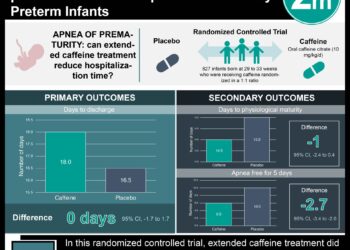Vaginal and intramuscular progesterone reduce high-risk singleton preterm birth
1. Systematic review of RCTs demonstrates reduced rate of early preterm birth (<34 weeks) for high-risk (previous spontaneous preterm birth, short cervix) singleton pregnancies with vaginal progesterone and intramuscular 17-hydroxyprogesterone caproate (17-OHPC).
2. Efficacy of vaginal progesterone and 17-OHPC may be more effective for women with short cervices.
Evidence Rating Level: 1 (Excellent)
Study Rundown: Preterm birth remains a major global cause of infant death and adverse health complications. Progesterone supplementation has been shown to reduce the risk of preterm birth and stands as the current clinical recommendation. This systematic review of international randomized control trials (RCTs) aimed to compare the efficacy of vaginal progesterone, intramuscular 17-OHPC, oral progesterone, and control for preventing preterm birth in high-risk pregnancies and reducing adverse maternal fetal outcomes. After employing rigorous screening of available studies and standardization of data inclusion, the primary outcome for this study was preterm birth (<34 weeks’ gestation); associated neonatal and maternal complications were assessed as well. According to study results, vaginal progesterone and 17-OHPC reduced the risk of preterm birth in high-risk pregnancies compared to control in singleton pregnancies. This risk reduction was most significant in high risk pregnancies due to short cervix. This study was limited by the availability and heterogeneity of data in the included trials, compromising the ability to assess the impact of oral progesterone and progesterone treatment on maternal and fetal outcomes.
Click to read the study in The Lancet
Relevant Reading: Prevention of Preterm Parturition
In-Depth [systematic review and meta-analysis]: This study aggregated participant-level data from 31 randomized control trials and included 11644 participants to assess the impact of exogenous progesterone (vaginal progesterone, intramuscular 17-OHPC, and oral progesterone) on preterm delivery for high-risk pregnancies. High-risk was defined as previous preterm birth or short cervix (<25mm). The outcome preterm birth was subcategorized to preterm birth (delivery <37 weeks), early preterm birth (delivery <34 weeks), and mid-trimester birth (delivery <28 weeks); singleton and multigestational pregnancies were analyzed separately. Various adverse neonatal events and adverse maternal outcomes were assessed in tandem.
When compared with control in singleton pregnancies, both vaginal progesterone and 17-OHPC reduced risk of preterm delivery <34 weeks (vaginal progesterone relative risk [RR] 0.78, 95% CI 0.68-0.90: 17-OHPC RR 0.83, 95% CI 0.68-1.01). However, this benefit was not observed in multigestational pregnancies (vaginal progesterone RR 1.01, 95% CI 0.84-1.20; 17-OHPC RR 1.04, 95% CI 0.92-1.18). Additionally, reduced risks of low birthweight (<2500 g), very low birthweight (<1500 g), and respiratory distress syndrome were seen with both vaginal progesterone and 17-OHPC. There was insufficient data from oral progesterone trials to reach meaningful conclusions. Regarding adverse neonatal and maternal outcomes, exogenous progesterone offered tempered benefits for reducing risk of neonatal severe necrotizing enterocolitis and severe retinopathy of prematurity in singleton pregnancies. The effects of exogenous progesterone on risk of maternal complications was unclear due to heterogeneity in collected data in singleton trials. Vaginal progesterone and IM 17-OHPC injections can cause adverse reactions and discomfort, thus engaging the mother in shared decision making is critical.
Image: PD
©2020 2 Minute Medicine, Inc. All rights reserved. No works may be reproduced without expressed written consent from 2 Minute Medicine, Inc. Inquire about licensing here. No article should be construed as medical advice and is not intended as such by the authors or by 2 Minute Medicine, Inc.





![Teixobactin appears to avoid bacteria resistance [PreClinical]](https://www.2minutemedicine.com/wp-content/uploads/2015/01/18170_lores-75x75.jpg)

